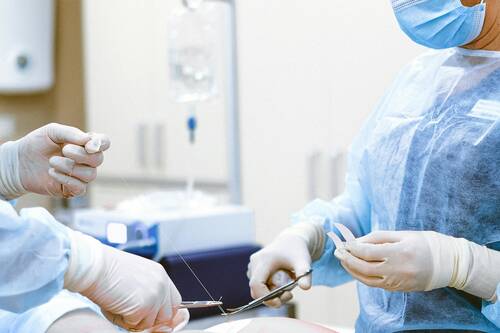
20 Sep Preparing for Surgery – What You Need to Know Before Your Operation
Whether planning a surgery or recovering from one, it is always important to take ample rest and prepare for a smooth experience. Preoperative preparation and post operative home care can, in fact, help minimize potential risks and ensure satisfactory outcomes.
Proactively optimizing physical and emotional well-being can help improve a patient’s overall health and increase their chances of a successful recovery. This may cover pre-surgery guidance and advice based on the patient’s medical history, dietary modifications, level and need of emotional support, and other practical considerations.
This article explores the various aspects of pre-surgery preparation to equip patients with the information and resources they need. The importance of pre-surgery care cannot be overstated, and patients must play an active role in their own healthcare for faster recovery.
Physical Preparation Before Surgery
A successful surgical outcome calls for not just skilled operations but also proper preparation beforehand. The following instructions are important for patients and their caregivers to maximize physical well-being and minimize the risk of complications during and after the procedure.
#1 Understanding Medical History and Current Conditions
Patients must provide a comprehensive and accurate medical history before any surgical treatment. This includes disclosing any allergies, current medications, and existing conditions.
The surgical team needs this information to assess potential risks and determine the best course of action.
For instance, additional testing or medication may be necessary for patients with a history of cardiac issues to ensure their safety during surgery. Similarly, being aware of any allergies can help prevent adverse reactions to anesthesia or other drugs used during the procedure.
#2 Monitoring Dietary and Lifestyle Changes
Dietary and lifestyle changes are often recommended to optimize a patient’s physical condition and reduce the likelihood of complications. Different guidelines may apply depending on the type of surgery and the patient’s specific health situation.
Patients may be advised to follow a specific diet in the days leading up to surgery – a clear liquid diet or a low-residue diet, for example. These measures can help reduce the risk of nausea, vomiting, and intestinal blockage. Maintaining a healthy weight and avoiding strenuous exercise can also facilitate a faster recovery.
#3 Stopping Smoking and Alcohol Consumption
Alcohol and tobacco use can significantly increase the risks associated with surgery. Both substances have the potential to delay healing, raise the risk of infection, and hinder wound recovery.
Therefore, it is strongly advised that patients avoid smoking and heavy alcohol consumption for a definite period before surgery.
Although quitting smoking can be challenging, numerous resources and support groups are available to help individuals achieve this goal. Similarly, abstaining from alcohol can improve overall health and reduce the likelihood of complications during and after surgery.
Common Concerns Associated with Different Types of Surgery
Depending on the operation, different levels of preparation may be needed for different types of surgery. You can adjust your pre-operative care by understanding the particular factors that apply to each type.
#1 Elective vs Emergency Surgery
Elective surgeries are those that can be scheduled at a time that is convenient for the patient, allowing for appropriate preparation, including mental and physical adjustments. Patients undergoing elective surgery often have additional time to ask questions or address any concerns they may have.
In contrast, emergency surgeries are unscheduled procedures needed to address life-threatening conditions. In these cases, quick decisions may be required with limited time for preoperative planning. The focus in emergencies is on stabilizing the patient and addressing the immediate medical need.
#2 Inpatient vs Outpatient Procedures
Outpatient procedures are completed within the same day and do not require hospitalization, whereas inpatient procedures necessitate overnight stays in a medical facility. The amount of pre-surgery preparation needed can differ between these two types of procedures.
Inpatient procedures may require more thorough examinations and testing, such as electrocardiograms or blood tests, and arrangements for post-operative care and transportation.
Outpatient procedures, on the other hand, usually involve less extensive preparation. This is because the patient can typically return home the same day. However, it is still important to follow any specific preoperative instructions the doctor prescribes.
#3 Major vs Minor Surgery
The level of preparation required varies depending on the complexity and extent of the surgery.
Major surgeries involve invasive techniques that may require extensive tissue manipulation or organ removal. These procedures often necessitate more comprehensive preoperative evaluations, including detailed medical histories, physical examinations, and specialist testing.
Post-operative care for major surgeries may involve longer hospital stays, pain management, and rehabilitation.
In contrast, minor surgeries generally involve smaller incisions or less invasive methods and typically require less extensive preoperative planning, with shorter recovery periods. Nonetheless, even minor surgeries should be performed carefully to minimize risks and ensure a successful outcome.
Conclusion
Pre-surgery preparation dictates how effective surgical outcomes can be since they focus on optimizing both physical and mental well-being. At the same time, such preparation can help reduce the risk of complications and improve the overall recovery experience.
Remember that individual preoperative requirements may vary, so clear communication with medical staff is essential to address any specific concerns. Patients must adhere carefully to pre-surgery instructions to improve their chances of a successful surgical experience and a swift recovery.
—————————————-
The information on MedicalResearch.com is provided for educational purposes only, and is in no way intended to diagnose, cure, or treat any medical or other condition.
Some links may be sponsored. Products, services and providers are not endorsed.
Always seek the advice of your physician or other qualified health and ask your doctor any questions you may have regarding a medical condition. In addition to all other limitations and disclaimers in this agreement, service provider and its third party providers disclaim any liability or loss in connection with the content provided on this website.
Last Updated on September 20, 2024 by Marie Benz MD FAAD
